- Home
- A. A. Attanasio
p1b6fn7sdh1ln0g4v1pkvkuqim54 Page 2
p1b6fn7sdh1ln0g4v1pkvkuqim54 Read online
Page 2
ionosphere at this level spreads over the globe in majestic hills and terraces.
To the radiant gods, these electric plains thrive with life. Rainbow forests flourish among silver veins of rivering currents. And in those forests and streams, animals of ionized gas fulfill their bestial life cycles: griffins, manticores, basilisks, rocs, fire serpents, chimera, and an
occasional sun-stallion alighting from its frolicking journeys among the solar herd.
Composed of plasma—electrically charged gas too
tenuous for human eyes to perceive—the gods and their terrain exist replete in their own world. For these dwellers of light, all that is below their magnetic kingdom looks steamy dark. The Earth's surface, far beneath the lowest and gloomiest branches of the Great Tree, has the frightful aspect of an underworld. A misty maze of tortured rock full of treacherous pits and steep crevasses, this hot place holds damnation for all who fall from the Great Tree.
The Dragon, ever voracious, hungers for more
power to hoard within its dreamsongs. It devours every being of light that dares approach within striking distance of its claws. Its cracked and bleeding hide exists as a place of horror for the gods. There, grotesque creatures dwell.
Hideous parasites have emerged from the Dragon's
blood, coagulating from the oceans, long ago.
Shapeshifting and diversifying, gruesomely mimicking the elegant life-forms in the Tree, these impossibly dense, organic things live out their brief, squalid lives on the planet's surface, a dark simulacrum of the spectral groves above.
The most abhorrent fact to the gods is that these
viscid monsters, shaped out of the Dragon's slime, are doomed to devour each other to survive. In the Great Tree, there are no carnivores. All radiant beings subsist on the solar fruits of the rainbow forests. And the gods hunt not for sustenance but to capture and reshape energy and thus tame and cultivate their radiant realm.
Down below, in the syrupy depths of the murky
atmosphere, the dim energy sustains only paltry green vegetation. All others must kill to live.
This brutal fact, as well as the real danger of the
predatory Dragon, repulses the gods, and they have, until recently, paid little heed to what transpires among the hellish mutations infesting the planet's weeping flesh.
Instead, they keep close to the Great Tree. In tribes and smaller clans within the tribes, these electromagnetic deities wander the huge boughs that carry a colorful world of forests, surging bluffs, and tiered lakes.
Brilliant cascades of electric current fall from the
lakes among the Tree's branches and splash earthward as auroras. On the shoulder of one such cataract, a god sits alone, watching the falls spin into the wind.
Far below, he spots the unicorn and absent-
mindedly follows its silver point of radiance as it trespasses the Earth.
The god wears a wide hat that slants a shadow over
a face already riven with shadow. One lone mineral blue eye gazes out from deep in its bone-cave. The other
socket holds only darkness. White eyebrows twisting
upward, sharp as lynx-tufts, ledge a massive brow marred by sun scars, worry furrows, and dents in his skull. This is a face shaped by suffering. Fierce lines carve weathered flesh, cutting blond creases in his eagle-sharp profile and disappearing into a boisterous beard.
Wrapped in a blue mantle, his hulking frame
crouching over itself where he sits at the crest of the falls, he looks like a cornerstone of the sky. He is the tribal chief of the Abiding North, and among his clan, the Rovers of the Wild Hunt, he is known as the Furor.
This is a name he earned in his exiled youth when
his tribe had to fight the gods who came before. The
Furor's ability to immerse himself at will in a maniacal killing trance helped destroy the Old Ones and earned him this name.
Since winning their place in the Great Tree many
years ago, the Rovers have ranged freely through their world. On one of the higher branches overgazing the
dunes of the wastes, they built a terraced compound and named it Home.
But these gods are rarely at Home. Their pleasures
are best fulfilled for them in their wanderings through the brighter wilderness of the lower branches, playing their favorite game: the hunt.
A long time has passed since the Furor enjoyed the
hunt. War troubles him—war with the Fire Lords and their minions. These aliens threaten to drive him and the other gods from their Home. Survival has required the Furor to resort to magic, and to acquire the power for that, he has had to seek knowledge in trance.
The Furor must withdraw to the stark limits of the
Tree to experience the deepest trances. Under the
perpetual night, where the stars shine big as globes, blue and orange, he binds his feet to a sturdy limb and hangs upside down. Head earthward, his spine serves as an
antenna. The magnetic flux courses through his backbone, directly into his brain.
His strength smokes away like a torrent blown off a
cliff, and pain transfixes him, crucifying him to his skeleton with a million hot nails piercing to the marrows. If he endures this long enough, he molts into a trance in which he sees. What he sees depends on what he looks for.
During the years of his first battles, the Furor looked for ways to destroy the elder gods. He was desperate. Any one of the Old Ones embodied brute power far stronger than all the Rovers combined. The elder gods had found
ways to collect power in phosphorescent pools. From those burning cisterns, they had grown giant fire eels and electric scorpions that could not be defeated in battle.
The Furor fled from the wrath of the Old Ones and
hid himself on the Dragon's hide, where the elder gods, for all their tremendous power, feared to go. There, the exiled god discovered the weapons to slay the Old Ones'
monsters—and the Old Ones themselves!
The city-dwellers of the Radiant South, worshipers
of the Fire Lords, learned how to use conductive metals, such as copper, silver, and gold, to bind electrical beings—
and to slay them. These human beings, these laughable creatures that lived but an eyeblink, had found the power to kill gods!
But the city clans of the Radiant South would not
share their weapons with a Rover of the Abiding North. So, he turned for help to lesser beings.
Trolls, the largest parasites of the Dragon, live as
chthonic beings with primitive bodies woven of quartz-light, piezoelectric fields, and tectonic discharges. In their larval phase, they crawl out on the surface of the Dragon and shapeshift among the other life-forms they encounter, stealing voltage at every opportunity.
As adults, trolls become giants. Swollen with as
much charge as they can scavenge in their long millennial prowls, they descend back into the earth, where they
circulate dreamily through enormous cycles of convecting magma. The Dragon cannot touch them, for they change
shape far too creatively.
The Furor sought out the oldest of the trolls, near
the end of its larval phase and at the brink of its
transmutation into its gigantic adult form. The Furor wanted all the knowledge that the troll had gained by eating the lives of people. For that knowledge, he offered the troll a piece of himself—his left eye.
The troll instantly agreed. With that much more
power it would make a splendid giant. From the troll's enormously bloated head, a serpent of lightning uncoiled and struck at the Furor's face. Its fangs came away with the god's left eye. All the human knowledge that the troll possessed from ten thousand years of devouring souls
rushed into the Furor through his torn socket, and the pain knocked the god unconscious.
In his stupor, the Furor dreamed of human life. For
nine ye
ars he slept, drifting among dreams of people's histories. Revenants of cave-squatters and hunters
replayed in his mind pieces of their lives. He crossed grasslands at a loping run and stared hard into the
campfire's mysterious auguries.
As a woman, chewing leather, kneading clay, he worked in snug cooperation with other women, chanting, singing, watching children drift in loose clouds. At
corpseside, the stink, the bitterness, and the grief. And no sound but the beating of a drum. A heartbeat. The
knocking pulse. Fear. And anger. Passion, too. Just like the gods! And then, the searing pangs of childbirth.
Screams ripped the air with a soul's hurt, and he paced the mouth of a cave on callused fists, a legless beggar.
The dream carried on like this, shunting him from
one fragment of human life to the next. He tried on many lives, and the more he suffered with them, the more his respect grew for these strong, resourceful people. Like himself, they, too, wanted to survive, and they strove as desperately as he to fulfill their puny moments on earth.
And then, he met the Fire Lords. Not directly. None
of the humans that the troll consumed had actually
encountered one of these luminant extraterrestrials; so, there was no immediate experience of them. Many people had heard of these remarkable gods. The Furor learned to his huge surprise that the Fire Lords intimately involved themselves in the meager lives of people!
When the Furor woke, he knew humanity, its carnal
heart, its dreamy mind—and he knew that these puny
beings had become a tool for powers far larger than the gods of the Great Tree. The Fire Lords exist as deities of the Great Forest, a union of all the magnetic trees orbiting all the blazing suns.
The Furor thirsted to know more about them. First,
he had to secure a place for his clan in the Tree. He used his costly knowledge to build weapons. Armed with swords of silver, gold, and copper, the young gods attacked the giant fire eels and electric scorpions guarding the elder gods' pools of power.
Battles surged for years. And that was years and
years ago—millennia. The Furor, sitting on shoulder-stones above a swelling cascade, shrugs off these ponderous
memories. So much has changed and yet so little is
different.
The Fire Lords continue to meddle with the roots of
the Great Tree that are entangled in human brains. And this murderous craft of metal weapons has gotten out of hand. A human simpleton with the right sword and a little luck could slay a god.
Worse than that—far, far worse—is the reality of
Apocalypse. He has seen it—the nuclear glare, the fiery, radioactive haze, the blighted earth. Hanging from the Raven Branch, the highest of the storm boughs, his
tranceful gaze has pierced time and he has seen this
horror he does not want to remember now. Among all these glorious memories of sacrifice and striving, the prophecy of Apocalypse is too bitter, too stupidly
meaningless to be true.
Yet, it is true. He has seen it, and it mocks
everything he has achieved.
The Furor gnashes a curse through his thick beard
and rises, his large body unfolding slowly as he
contemplates what he must do. He is tired. Around him, opalescent mists from the falls swirl in cusps and
parabolas.
The unicorn that he has been vacantly watching as
he reminisces continues to move below, a hot point of star-colored light. He ponders briefly what alien impulse
dropped it out of the void to scrawl its sigils of strange energy on the hide of the Dragon. Then, weariness
overwhelms his speculation. He is old and fatigued.
Looking for strength to go on, he stares up into the
wind with his one eye. He gazes through rents in the day's blue veil into the starry wheels of night that perpetually circle the Great Tree. And he sighs wearily at what there is to do.
Vale of the Silures A.D. 458
Fog sashes the waists of trees in the dark valley—
massive, primeval trees with thick interlocking boughs through which moonlight splashes. A small company of
riders moves hurriedly in the diffuse light, clinging to the slender necks of their ponies. Leaf litter of a thousand summers muffles their nimble hoof-falls, and they flow along wide avenues between the trees in fleet, watery shadows.
At their lead, Ygrane, the thirteen-year-old queen of the Celts, streams white veils behind her, a wraith flying through the moony air. Her bare-chested male
companions, swords strapped across their shoulders,
follow vigilantly, the wind of their flight brushing back long hair and thick mustaches. They wear leather footgear, buckskin trousers, and the gold throat bands that identify them as the queen's guard, the fiana.
Their destination is close by, a tarn where dragon-
heat percolates and where, at the full of the moon, a branch of the Great Tree touches earth. The queen intends to climb the Tree.
In swift pursuit, less than a league behind, the dread Celt warrior Kyner leads a band of his fiercest comrades, intent on stopping the queen. The Druids have sent them.
The priests-with-sight know that she can do what she
claims, that she can accomplish what none has done in living memory: climb the Great Tree.
But the priests-with-sight cannot see into the Tree,
and what they cannot see, they cannot control. The
Druids—both seers and politicians—will not relinquish control of their queen and her fanatic followers. The power has belonged to the ruling class of Druids for centuries, and they are not about to squander it on an unpredictable child-sorceress.
So they have forbidden her to climb—and they have
found for her a husband to keep her carefully bound to earth, a Roman, or at least what has passed for Roman out here in the farthest-flung outpost of the fallen empire. She will not climb into the netherlands beyond the sight. The patriarchal Druids are determined. And, if her defiance persists, the question of her authority will be answered by Kyner's blade.
Death cannot daunt this queen. She herself has the
sight—and more. She knows the mysteries of talismanic magic. She remembers them from her former life. If her assault on heaven fails this time, if Kyner's sword cuts her lifeknot, she will return. She will try again.
The queen is determined to come back as often as
she must, for she knows this truth: The fate of peoples, of nations and empires, is forged not on human battlefields but in the netherlands by gods, living gods, who can be wounded—and healed. To save her people, she will pit her ancient magic against these mortal gods.
In a sepulchral glade filled with the soft, fluid light of the full moon, the queen's party pauses as she feels for direction. Talismans that she and her fiana have left behind them, dangling from branches through the last three
leagues of the forest, glitter like wind chimes in her mind.
They block the sight and protect her from the Druids'
surveillance.
Also, they warn off pursuers, for their meaning is
indisputable: bone assemblages bound in barbs of razor wire, sculpted to resemble chains of small, precise human skulls.
The young queen and her party know that these
barbarous fetishes will not intimidate Kyner. He and his battle-toughened troops are Christian Celts.
The night throbs with silence. While the fiana listen apprehensively for the mute thunder of Kyner’s approach, the queen lifts her freckled face, and her fair, pubescent features compose themselves sleepily. Her mind feels
inward for the timewinds. As ever, they blow through her in frail, jostling currents, untraceable filaments knotting into ghostly wisps and webworks of chill feeling.
The direction to the tarn is clear to her, a platinum breeze
sluicing across the glade from directly ahead. But that is not what she seeks. She feels for other directions, any without the iciness of death in them. None offer
themselves.
The queen sparks her pony forward, and the
saddleless riders slip swiftly across the silver glade. Under the black vaults of the forest, the terrain descends so sharply the steeds slew sideways. When the footing levels, they are waist-high in bracken and fog, the spongy ground quaking as they advance toward a long pool of still black water, the tarn.
Willow and cypress drape the banks and cast zinc
reflections of themselves in the ghostly water, where a smaller moon drifts. A rich warmth of smells greets the night riders: vegetal decay, breeding mud, and manure from the scrawny red cattle the drovers bring to water here.
Ygrane dismounts and lets her pony wander off
among the willow manes in search of succulents. Her fiana release their steeds as well and deploy to their fighting stations, senses straining to detect the arrival of their enemy. These seven men Ygrane selected herself over the past year, using the sight to find those who could best die for her. She made sure she would leave no widows among the clans, no families denied their only sons.
Each is marked by battle and each of their blades
anointed with the blood of invaders. None has spilled Celtic blood—yet.
The queen climbs atop a broad rock shelf
overhanging the ebony pool. From within her diaphanous white raiment, an inexplicable light outlines her adolescent body. When she turns to scan the overhanging boulders and their dark twists of cypress, wisps of electric smoke flit into thin air.
At the far side of the tarn, a stone's toss away, a
perpendicular cliff rises above the forest. Moonshadows cast by ragged clouds sweep across its striated face, and the atmosphere feels charged with presences.
Aware that this tarn was sacred to the ferocious
Silures, the warrior tribe that the Romans crushed here four centuries earlier, Ygrane looks for their shades. Bats spin in the bright air above cliff rookeries, and owls call to each other like cries from a spent dream.
There are no shades tonight. If there had been, the

 The Conjure Book
The Conjure Book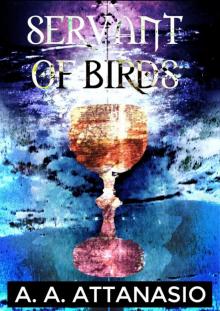 Servant of Birds
Servant of Birds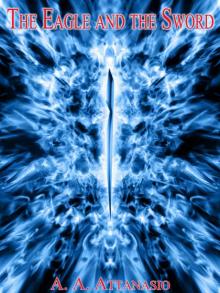 The Eagle and the Sword (The Perilous Order of Camelot Book 2)
The Eagle and the Sword (The Perilous Order of Camelot Book 2)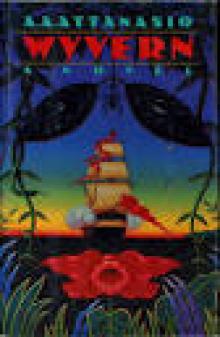 Wyvern
Wyvern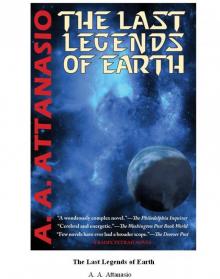 The Last Legends of Earth
The Last Legends of Earth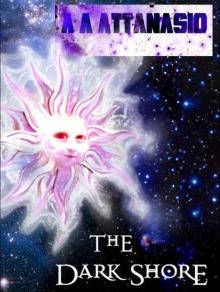 The Dark Shore (The Dominions of Irth Book 1)
The Dark Shore (The Dominions of Irth Book 1)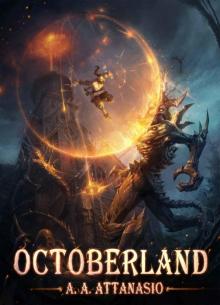 Octoberland (The Dominions of Irth Book 3)
Octoberland (The Dominions of Irth Book 3)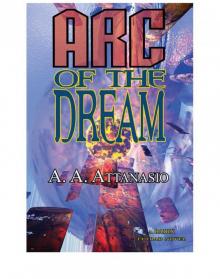 Arc of the Dream
Arc of the Dream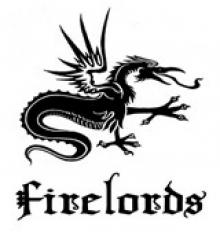 p1b6fn7sdh1ln0g4v1pkvkuqim54
p1b6fn7sdh1ln0g4v1pkvkuqim54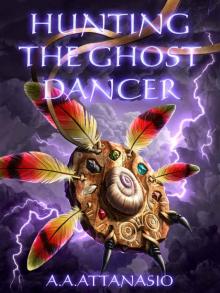 Hunting the Ghost Dancer
Hunting the Ghost Dancer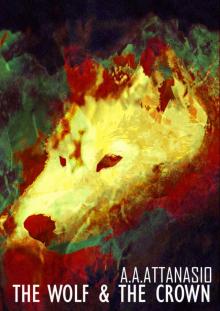 The Wolf and the Crown (The Perilous Order of Camelot Book 3)
The Wolf and the Crown (The Perilous Order of Camelot Book 3)